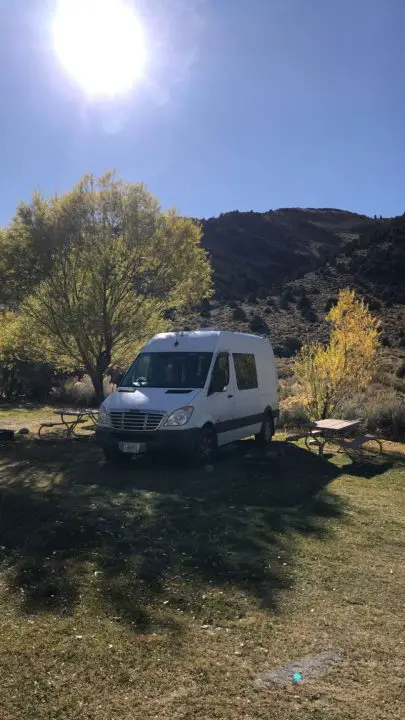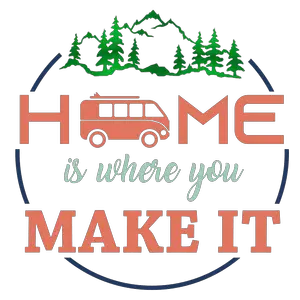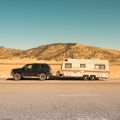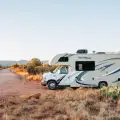Hey! This site is reader-supported and we earn commissions if you purchase products from retailers after clicking on a link from our site.
One of the first reactions I receive when people find out I’m living and traveling in my van is “…and you’re doing this all by yourself?” Next they ask if I have a dog (no), a gun (nope), or a partner (not one traveling with me). So without the three biggest security factors, how do you stay safe when traveling and sleeping in your van?
Table of Contents
- 1. Scope Out Your Surroundings
- 2. Have a Plan B
- 3. Schedule Gas Stops
- 4. Share Your Location
- 5. Safety Tools
- 6. Beware of Bears
1. Scope Out Your Surroundings
Before I stop for gas, stop at a Walmart, or pull into a campsite, I scope out my surroundings. Are there other people around? Is the parking lot lit? Do I have to walk around the back to enter? Unless I’ve been there before or unless it’s someone’s home, I always get to where I’m sleeping before it gets dark. In general I try not to drive at night to avoid any opportunity to break down or hit an animal in a foreign place while it’s dark out. When it comes to camping, as much as I’d love to always be off-grid and totally one with nature, when I’m alone I opt for more established sites where a few other people are close by, I have cell phone reception, and if it’s a parking lot it’s well-lit. I also have an option to pee inside the van in case I have to go at night and I don’t want to leave the van.

Established camping outside Yosemite National Park.
2. Have a Plan B
I love spontaneous travel, but I also love planning my day out so that I at least have an idea where I’m sleeping that night. For every campsite I research, I have at least two backups in case they are taken, flooded out, I feel unsafe, or inaccessible with the van. Trust your gut, girl.
3. Schedule Gas Stops
There is nothing worse than running out of gas – especially when you may be 100 miles from the closest gas station. As soon as my tank hits ½ empty, I search how close the nearest gas station is to fill up and I try not to let my tank get below ⅔ empty. This may sound neurotic but in some parts of the country the gas stations truly are few and far between.
4. Share Your Location
When I’m using Google Maps it sends my real-life location to a few contacts (my mom). I also let people know where I intend to head and about what time I should get there. If I’m going to be going through spots without much cell reception, I let people know that they probably won’t hear from me for a while. I use the weBOOST cell phone service booster to increase my cell coverage throughout the country. There are still some dead zones, but it helps a lot. When I’m hiking alone, I leave a note on my van saying what trail I’m hiking, when I left and intended to return, and an emergency number to call in case my van is left there too long.
5. Safety Tools
My van is equipped with a pretty stellar Viper alarm system so I feel safe when I’m sleeping inside. Next to my bed, I also have a personal alarm, pepper spray, and folding knife just in case. This is a habit I’ve been trying to be better about, but keep your driver’s seat clear of clutter before going to bed. If something happens in the middle of the night, you should be able to grab your keys (keep them in the same place every night), hop in the driver’s seat, and roll out.
6. Beware of Bears
The wildlife in some parts of the country are NOT to be messed with! Be bear smart at most of the national parks in the west: carry bear spray when you’re hiking, try not to hike alone in bear country, and lock up all scented food and toiletry items at night. If I am hiking alone in bear country, along with bear spray I also carry my keys on my waist and they jingle enough to warn animals that I’m approaching. Ain’t nothing worse than a startled mama bear.
While being on the road as a solo traveler (and especially a solo female traveler) can be dangerous at times, I have very rarely felt unsafe in my surroundings. I have also had to learn the difference between feeling uncomfortable with what is new and outside my comfort zone and when I am actually unsafe. Trust your gut, plan ahead, and you should be just fine!
For more safety and security tips, read Brian’s article on RV security.





